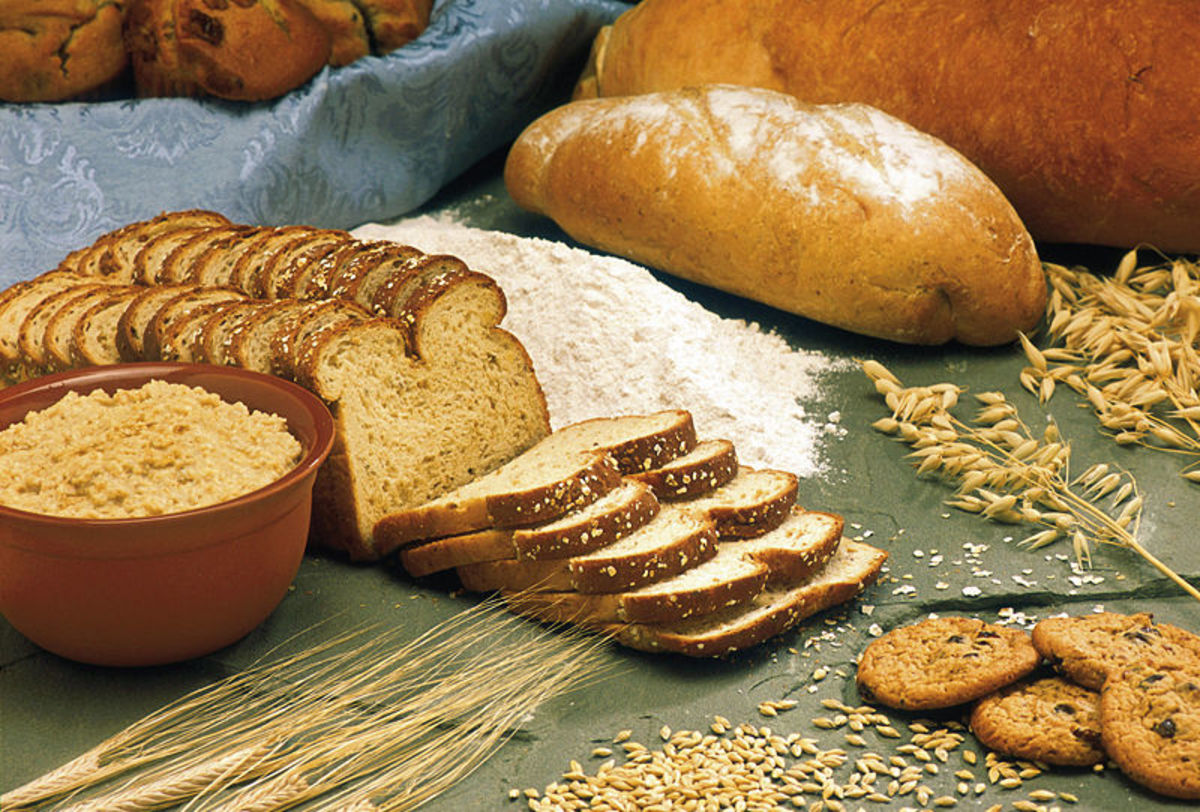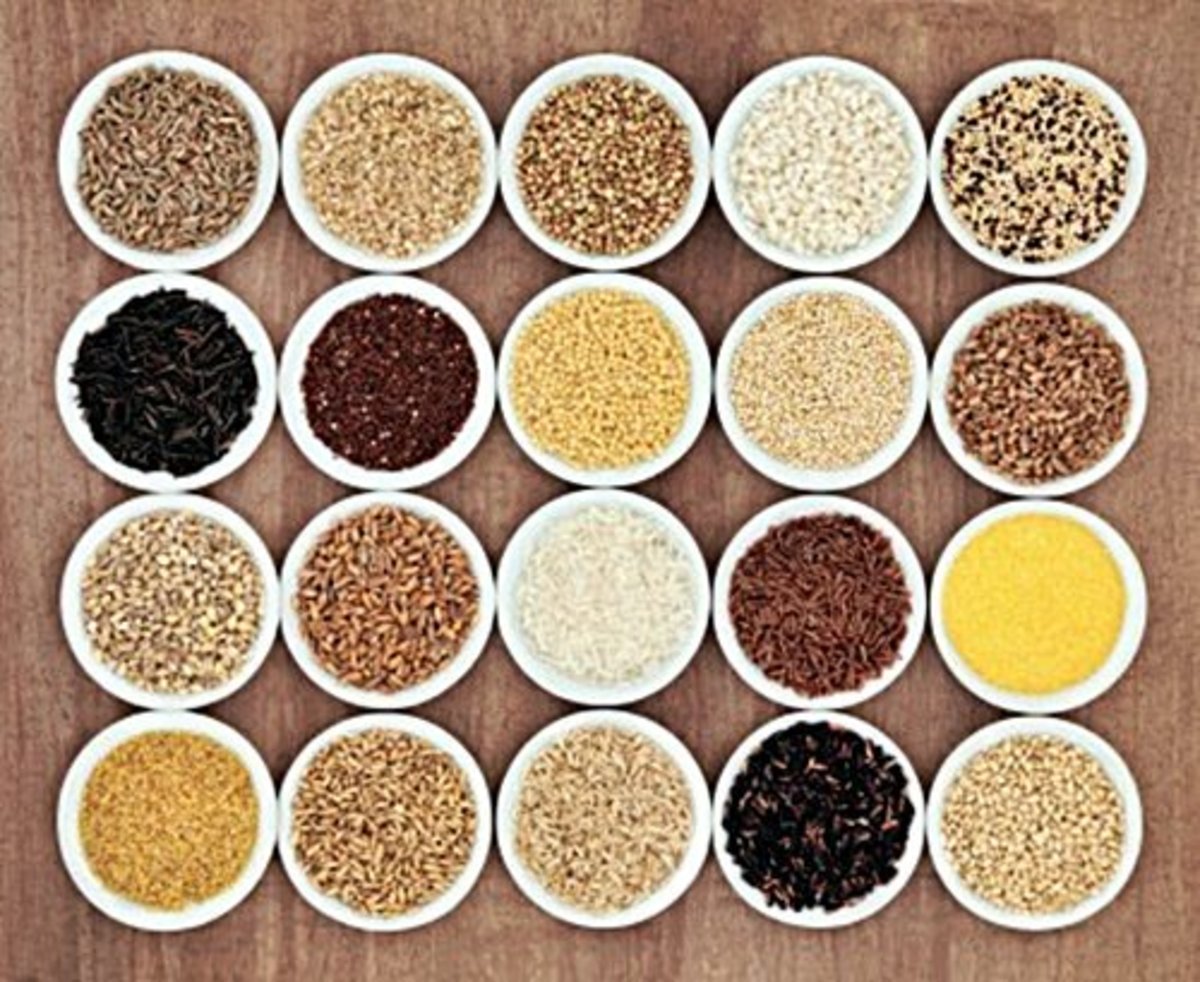Why Wheat Bread is Unhealthy
Wheat bread, whole wheat pasta, whole wheat English muffin and other wheat products are unhealthy for two reasons: (1) they contain gluten, (2) they are refined high-glycemic carbohydrate.
This may sound surprising to some, since wheat is considered a whole grain which some people considers to be healthy; while others do not. So let's try to understand the science why wheat is bad.
Book: "Bread Is the Devil"
Wheat contains gluten
Wheat bread contains gliadin which is a type of gluten that allows air pockets to form via the action of yeast. Gliadin irritates the gut wall and many people have allergies to gliadin.
FoodForTheBrain.org says ...
"Eating a lot of wheat products isn't good for anyone, especially if you're child has developed an allergy. The connections between wheat allergy, autism and ADHD are well established."
Gluten is not just in wheat bread, it is in most bread, pasta, pastries, and many processed foods. Unless a bread specifically is labelled as gluten free, you can assume that it contains gluten -- be it white or wheat or whole bread.
Gluten Sensitivity
Because gliadin is a form of gluten. You might find more information doing a search for the more popular term "gluten".
Everyone is sensitivity to gluten in wheat to some extent. It is just a matter of degree. Those who have strong sensitivity to gluten may eventually develop Celiac disease, whose only cure is to avoid eating gluten.
However, those who do not have full-blown celiac disease can still exhibit negative health damages from gluten. These people are known to have "non-celiac gluten sensitivity" and many the people who have problems with gluten do not know it, as they attribute their symptoms to other causes without ever suspecting that it is wheat. Even some doctors are not aware of this.
Gluten sensitivity can cause a whole variety of diseases include rheumatoid arthritis, irritable bowel diseases, fatigue, anxiety, depression, and many autoimmune disease. We are not saying that all these symptom are always due to gluten. They can be caused by other things. However, in some causes gluten have been linked to such symptoms.
The gliadin in wheat gluten causes intestinal permeability (also known as "leaky gut syndrome"). Having a leaky gut can lead to an autoimmune disease. When the gut is "leaky", stuff such as partially digested food peptides and toxins can leak into the bloodstream when they are not supposed to. The body's immune system sees these as foreign materials and initiates immune response that results in chronic systemic inflammation. That is why gluten can cause such wide ranging symptoms.
Dr. Mark Hyman's article "Gluten: What You Don't Know Might Kill You" talks about the dangers of gluten.
Gluten is not just a problem in wheat bread. But gluten is found in most bread, pasta, pastries, many processed foods.
Wheat contains other anti-nutrients
Wheat contains other anti-nutrients such as Wheat Germ Agglutinin which can pass the blood brain barrier and people with gluten sensitivity may experience neurological and psychiatric conditions.
Article on Mercola.com says ...
"Eating wheat may not be beneficial to your health. Among many other reasons, each grain contains about one microgram of Wheat Germ Agglutinin (WGA). Even in small quantities, WGA can have profoundly adverse effects. It may be pro-inflammatory, immunotoxic, cardiotoxic ... and neurotoxic."
People Who Think Wheat is Unhealthy
Dr. William Davis wrote book Wheat Belly which explains why eliminating wheat is a good idea and can provide relief of various health and digestive problems for many people.
Watch his YouTube video on the right where he says (and I quote) ...
"Wheat products such as two slices of whole wheat bread raise your blood sugar higher than nearly all other known foods."
And wheat is mildly addictive because it contains gliadin which can turn into a morphine-like compound that can cross the blood brain barrier into the brain and bind to morphine receptors increasing your desire to have more of the stuff. Gliadin is also an appetite stimulant.
Paul Jaminet of the "Perfect Health Diet" calls wheat the most toxic food. He writes that wheat causes the "leaky gut sydrome" which is a pre-requisite for autoimmune diseases such as Crohn's disease, rheumatoid arthritis, Hashimoto's Disease, lupus, and Type I diabetes. Wheat causes the increased permeability of the gut (known as leaky gut) because the gliadin activates the CXCR3 receptor and triggers zonulin release.
Paul writes ...
"If you eat wheat, it’s probably only a matter of time before you develop some disease or other. All of the autoimmune diseases, from rheumatoid arthritis to Hashimoto’s to lupus, are made more likely by wheat consumption." [reference]
Switch to what he calls "safe starches" such as rice and potatoes, and you avoid the problem of wheat.
Nora Gedgaudas has a whole chapter titled "Grains: Are They Really a Health Food?" in her book Primal Body, Primal Mind. It provides an excellent explanation of gluten intolerance and celiac disease.
She writes ...
"... grain consumption of any kind, especially gluten-containing grains, just isn't worth the dietary risk ... there is no one alive for whom grains of any type are essential for health, and gluten, in particular, is a health food for no one." [page 47-48]
Problem with Bread
Gluten is certainly a problem with wheat; it is also a problem in white bread too. Gluten is a protein found both white or wheat bread. Most bread contain gluten (unless they specifically say gluten-free).
According to J Stanton in the video below, there is not much difference between white or wheat bread -- they are both bad for you.
Wheat Bread is High Glycemic Carbohydrate
Dr. Mark Hyman wrote in HuffingtonPost that wheat can cause other problems aside from gluten. It can lead to weight gain, inflammation, and diabetes. He writes ...
"Two slices of whole wheat bread now raise your blood sugar more than two tablespoons of table sugar"
Wheat bread is a processed food. If you look in the ingredient label some of them contain high fructose corn syrup and sugar. Sugar and processed carbohydrates that quickly turns into sugar is to be avoid as it leads to insulin resistance, high blood glucose level, diabetes, and obesity.
I talk more about why sugar is so bad in another article.
The glycemic index of a carbohydrate measures how quickly it breaks down into sugar. The higher the glycemic index the worst it is. This means that the food will turn into sugar quickly giving you an spike in glucose and insulin level in your blood. High levels of glucose and insulin in your bloods is damaging to many of the organ tissues.
What About Whole Grains
Some people believe we should eat whole grains. Other health experts believe that one is better off without grains -- whole grains or not.
The Paleolithic Diet is one diet that is low in carbohydrates and avoid all grains (especially wheat), avoids legume (such as beans), and avoids dairy. The idea is that from an evolutionary point of view, paleolithic human did not eat these types of foods. Our genes have not evolved to be compatible with grains, legumes, and dairy.
Wheat has evolved chemical compound (such as gluten) as their own defense mechanism. In order to wheat to survive and propagate, it can not let animals (including humans) eat it. Hence wheat developed this compound which when eaten makes the animal ill. Those wheat that survived till today have successfully evolved this strategy.
Paul Jaminet's "The Perfect Diet" is somewhat similar to the Paleo diet, but less restrictive in that it allows "safe starches" such as rice and potatoes. Here "safe" refers to the fact that it does not contain as much anti-nutrients as as the other grains. Rice and potatoes do not contain gluten.
If you want to go further and eat whole grains. It is recommended that you pick those without gluten. Quinoa and brown rice are both gluten free whole grains.
Note:
Of course, there are many people who can eat a piece of wheat bread without any problems. But it is a good idea to eat toast for breakfast, sandwich for lunch, and pasta for dinner decades after decades. For some people, this over-exposure to gluten may eventually develop into gluten sensitivity issues. For example, many people with Celiac disease (gluten sensitivity) did not have the problem at first. But then eventually they developed it sometime in life for some reason (perhaps triggered by stress or other factors).
This article was written in May 2012 and is opinion at the time of writing. Whether you believe it and to what extent is up to you. As for my opinion, I do not eat cereal, bread, pasta, or drink milk on a regular basis. But once in a while if it is the only convenient thing to do or socially acceptable thing to do, then I will eat them. I will occasionally eat white rice, brown rice, quinoa, and beans.








